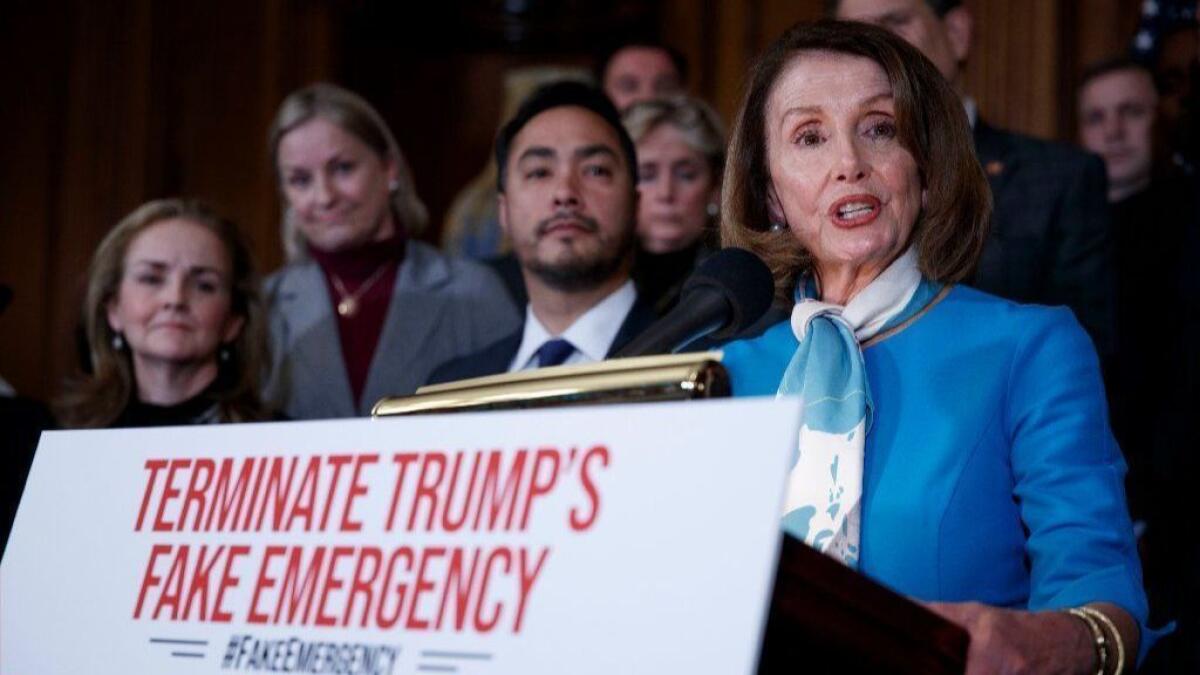House passes resolution overturning Trump’s border emergency declaration

- Share via
Reporting from Washington — The House’s approval Tuesday of a resolution to override President Trump’s emergency declaration at the southern border sets up a difficult vote for Senate Republicans.
Three Republican senators have said they plan to support the resolution, just one shy of the four GOP votes needed to pass it out of Congress, assuming all Senate Democrats vote yes.
It easily cleared the Democratic-controlled House on Tuesday evening by a vote of 245 to 182.
Passage in the Republican-controlled Senate would be exceptionally embarrassing for Trump. He has vowed to veto the resolution if it reaches his desk, and it is unlikely there will be enough votes in either chamber to override him.
The three GOP senators who say they will vote to rescind Trump’s emergency order are Lisa Murkowski of Alaska, Susan Collins of Maine and Thom Tillis of North Carolina. Sen. Rand Paul (R-Ky.) and several others said Tuesday they were still undecided.
“I don’t think it’s a good way to run government — to run government by emergency,” Paul said.
The National Emergencies Act allows Congress to rescind an emergency declaration by the president. The same law now requires the Senate to vote on the resolution within 18 days, and Senate Majority Leader Mitch McConnell (R-Ky.) said the chamber would probably use most of that time.
“I personally couldn’t handicap the outcome at this point, but we will certainly be voting on it,” McConnell said.
The White House campaign to persuade other Republicans not to buck the president continued Tuesday with Vice President Mike Pence and the counsel for the Justice Department attending a weekly party lunch.
Senators leaving the lunch said they discussed the cost of wall construction, where to pull money from and the legality of Trump’s declaration. Even McConnell said afterward that “I haven’t reached a total conclusion” about whether it’s legal.
Congress explicitly declined to fund Trump’s border wall when it passed legislation that included $1.375 billion for border barriers, but no money for a wall and far less than the $5.7 billion he had requested. Trump acknowledged when issuing the emergency order that he was doing so because it was a faster way to get money for a wall, a key campaign promise.
Democrats argue that Trump’s order is an end run around lawmakers and must be rescinded to protect Congress’ constitutionally granted power to determine how taxpayer dollars are spent. They have focused on positioning the resolution as a fight over the separation of powers granted to the three branches of government, not a partisan fight over the wall.
“This isn’t about the border,” House Speaker Nancy Pelosi (D-San Francisco) said Monday night. “This is about the Constitution of the United States. This is not about politics. It’s not about partisanship. It’s about patriotism.”
Some Republicans worry that if they give this president leeway to go around Congress — and its hold on the nation’s purse strings — future Democratic presidents will issue emergency declarations for things like climate change or gun violence.
But many GOP lawmakers are holding their cards close on how they will vote.
Defections are likely to be low. Although dozens of conservative appropriators and defense hawks have said they are skeptical of the president’s tactics, only 13 Republicans joined House Democrats on Tuesday in supporting the resolution.
They have largely cited concerns about which military construction projects Trump plans to tap for the billions the president wants for his wall. The Pentagon emphasizes that it does not plan to touch housing projects on military bases, but hundreds of other projects are still being weighed.
Kentucky Republican Rep. Thomas Massie, whose district backed Trump by more than 35 percentage points, said that he agrees there is a crisis at the border, but that it’s not an emergency when Congress doesn’t do what the president wants.
“It’s a difficult vote in terms of voting against something that would allow him to achieve one of his priorities, but I think the way you do it is as important as what you do when you’re following the Constitution,” said Massie, who voted with Democrats to rescind Trump’s declaration.
Democrats hoped a higher number of House Republican “yes” votes would have smoothed the way for Senate Republicans to join them. But generally the House GOP caucus stuck together.
Several Senate Republicans said this week that the president is within his rights to declare a national emergency, and reallocate military funds, to protect the country.
Sen. John Kennedy (R-La.) said that past presidents had used emergency declarations dozens of times and that the president is acting within the powers Congress has given him. “I also happen to believe we do have a national emergency at the border, so I will vote to support the president’s decision,” Kennedy said.
House Majority Leader Steny H. Hoyer (D-Md.) said Trump’s emergency declaration is different.
“This is the only one — the only one — that has been used to get around a Congress’ refusal to appropriate money for a particular objective,” Hoyer said. “And I would hope that we will get substantial Republican support. If they vote their conscience and the Constitution, we will. If they vote party and politics, we won’t.”
More stories from Sarah D. Wire »
More to Read
Get the L.A. Times Politics newsletter
Deeply reported insights into legislation, politics and policy from Sacramento, Washington and beyond. In your inbox three times per week.
You may occasionally receive promotional content from the Los Angeles Times.











